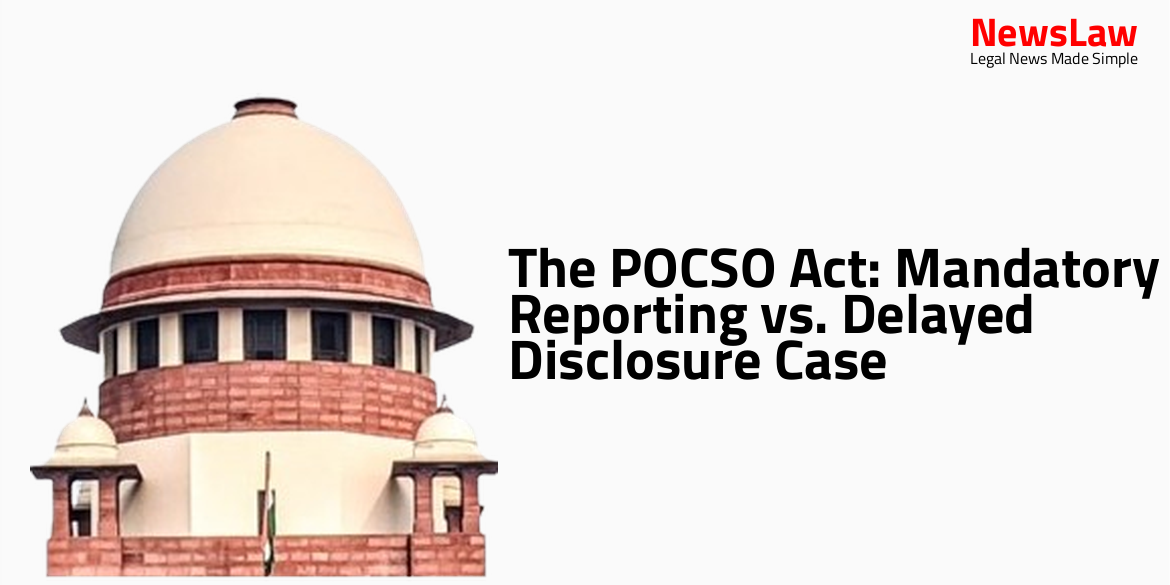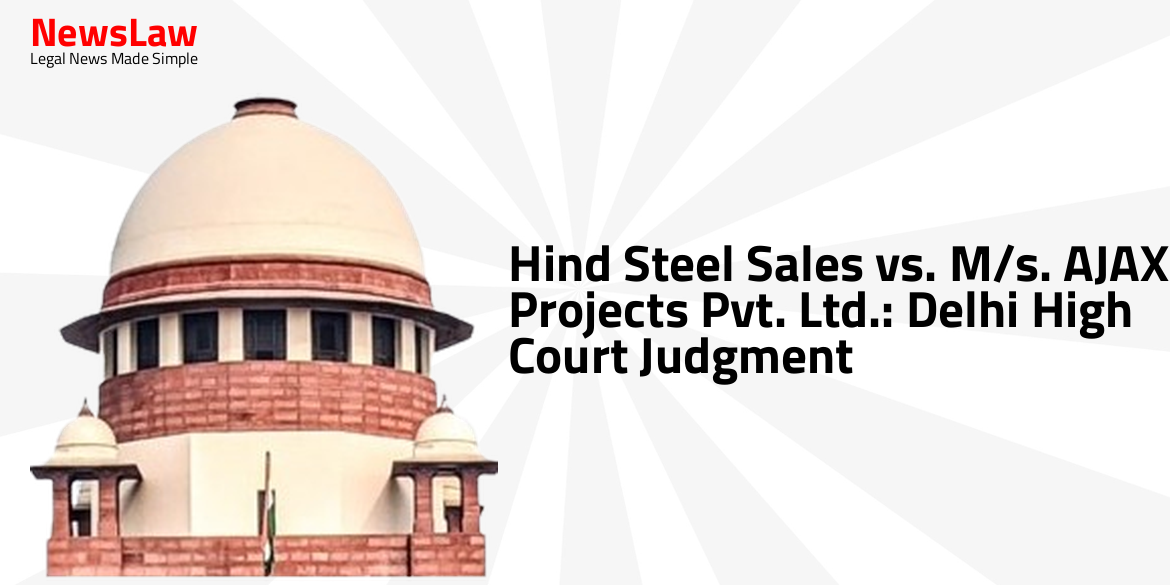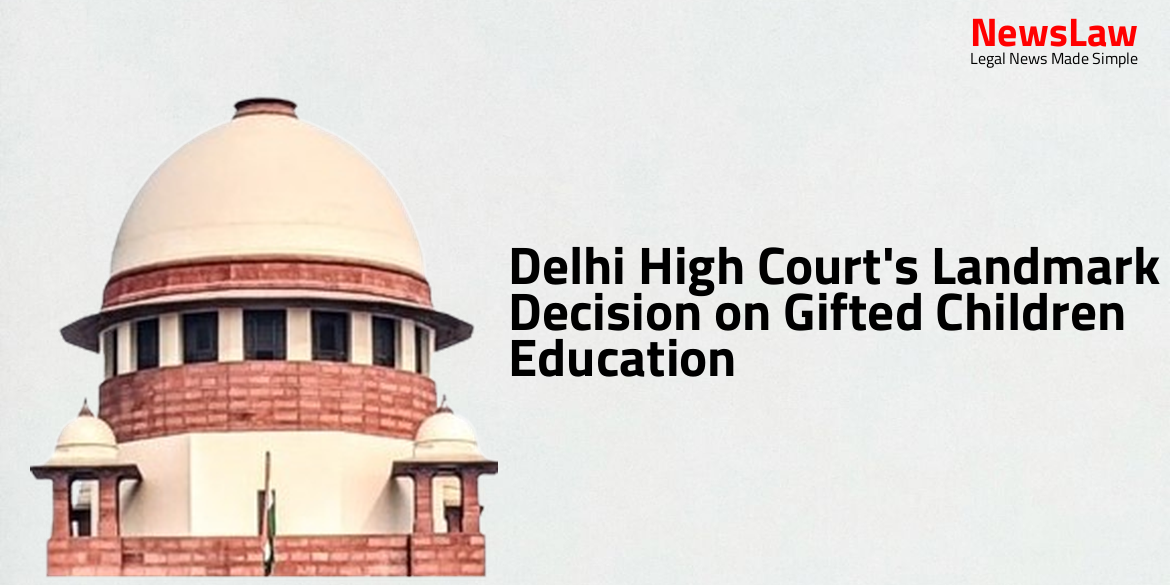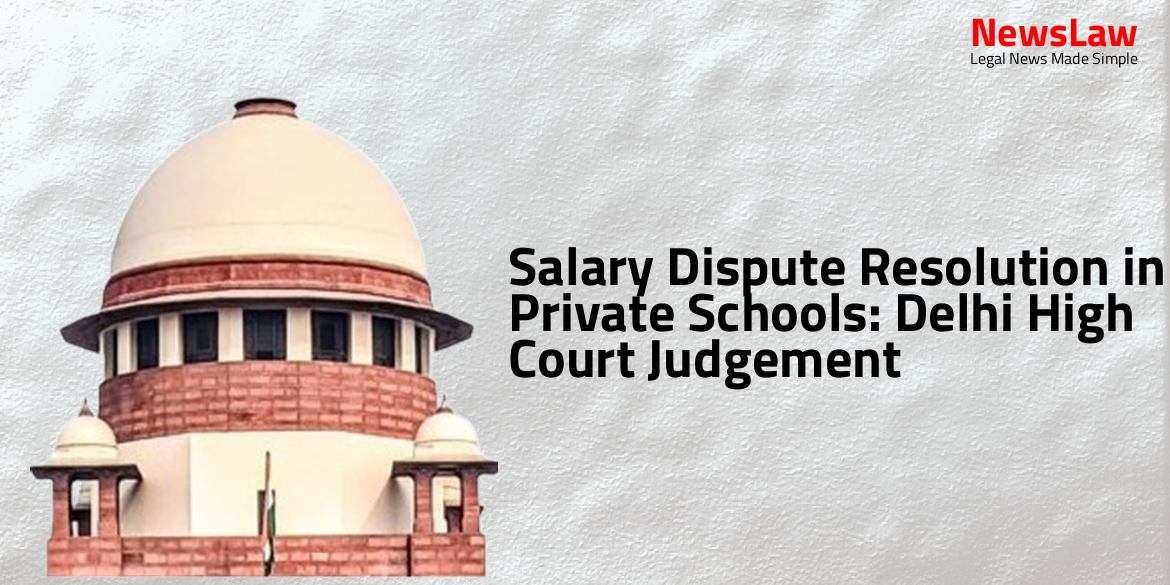Exploring the nuances of mandatory reporting versus delayed disclosure under the POCSO Act, the Delhi High Court is examining a case wherein the petitioner and respondent grapple with issues of timely reporting of a serious incident. Stay tuned to unravel the legal intricacies surrounding this crucial case.
Facts
- The father of the survivour sent a complaint to the Directorate of Education, Delhi alleging sexual assault on his son by classmates.
- The school management responded by rusticating two students and issuing warnings to three others.
- Charges under Section 21 of the POCSO Act were framed against the Principal and Vice-Chairperson of the school.
- The survivour and his father testified during the investigation, corroborating the initial complaint.
- The survivour’s statement was recorded under Section 164 of the Cr.P.C. where he detailed forceful unnatural sex by classmates.
- The father of the survivour provided a letter of satisfaction to the school authorities assuring not to take legal action.
- An application under Section 319 of the Cr.P.C. for impleadment of the father and another person as accused was dismissed by the Special Judge.
Arguments
- The counsel for the Petitioners argued that ‘mandatory reporting’ under Section 21 of the POCSO Act should not be confused with ‘delay in reporting’ or ‘failure to report’.
- The Petitioners revealed the identity of the survivor and themselves, which is against the provisions of the POCSO Act and various judgments.
- The survivor mentioned mistreatment by the Principal, the Vice-Chairperson (Petitioners), and a Teacher-in-Charge in his statement.
- The counsel highlighted the father’s (Petitioner No.2) knowledge of the assault a year prior and the delay of 13 months in reporting the incident.
- The legislative intent behind the POCSO Act was to safeguard children from sexual abuse even by close relatives/parents, thus emphasizing reporting by ‘any person’.
- The father of the survivor was suggested to be treated as an accused for failing to report on time, and no immunity should be granted under Section 132 of the Evidence Act.
- Case laws and judgments were cited to support the argument that the father’s admission of prior knowledge can be used against him in civil and criminal proceedings.
- The argument challenged the protection of self-incrimination under Section 132 of the Evidence Act based on the circumstances.
- References were made to specific judgments to strengthen the argument made on behalf of the Petitioners.
Analysis
- In Kamal Prasad Patade (supra), the High Court of Chhattisgarh quashed the proceedings against the petitioner based on the timing of the reported crime and the registration of the FIR on the same date.
- The principles of Revisional jurisdiction highlighted in Amit Kapoor vs Ramesh Chand & Anr (2012) 9 SCC 460 emphasize gross errors, non-compliance with the law, lack of evidence, or arbitrary exercise of judicial discretion.
- The judgment in Rajasthan vs Fatehkaran Mehdu (2017) 3 SCC 198 underlines the need to correct patent defects, errors of jurisdiction, law, or perversity within proceedings.
- Mandatory reporting was discussed in a case before the Hon’ble Punjab and Haryana High Court where failure to report a POCSO Act offence was deemed sufficient grounds for action against the responsible party.
- Section 132 of the Indian Evidence Act provides immunity to witnesses from arrest except for giving false evidence, but this immunity does not cover instances where the witness is obligated to speak the truth.
- The rule of strict construction in interpreting substantive law is highlighted, emphasizing protection of substantive rights unless the statute implies otherwise.
- The Supreme Court’s decision in R. Dinesh Kumar @ Deena vs. State stressed the liberal construction of the statutory immunity against self-incrimination provided under the proviso to section 132 of the Evidence Act.
- In State of Jharkhand v. Ambay Cements, the strict construction rule for penal statutes was reiterated, requiring clear legislative language for penalization.
- The Supreme Court’s stance in State of Gujarat vs Sandip Omprakash Gupta reiterated the need for strict construction and adherence to penal statutes.
- Delay in making the complaint by the petitioner can be used as a defense during the trial.
- Reporting the nature of the incident is mandatory as per the provisions of the POCSO Act.
- Timely intervention is crucial considering the objectives of the sections mentioned.
- The explanation for the delay will be assessed by the Trial Court if raised by the petitioner as a defense.
- The complaint filed by the petitioner will not fall under Section 21 of the Act for ‘failure to report’.
- The petitioner had reported the case to authorities leading to the FIR registration.
- Previous legal cases cited are not directly applicable to the current petition.
- In the present case, respondent no. 2’s complaint initiated the legal proceedings with the FIR and prosecution evidence.
- Explanation for the delay in filing the complaint was provided during testimonies by respondent no. 2 and the survivor.
- Distinguishing factor from other cases is that no complaint was filed by the petitioners despite receiving information.
- Any person who has apprehension or knowledge of an offence under this Act must report it to the Special Juvenile Police Unit or local police.
- If a child is the informant, the report must be recorded in a simple language that the child can understand.
- If needed, a translator or interpreter must be provided to the child during the recording process.
- If the child is deemed in need of care and protection, immediate arrangements must be made for their well-being.
- The Special Juvenile Police Unit or local police must report the matter to the Child Welfare Committee and the Special Court without delay.
- No person shall face any liability for providing information under this Act in good faith.
- Failure to report or record an offence under this Act can lead to imprisonment or fine.
- Any person in charge of a company or institution failing to report an offence of a subordinate can also face imprisonment and fine.
- Courts are not concerned with what might possibly have been intended in such cases
- Courts are to construe strictly in accordance with the provisions of law
- Nothing can be implied in these situations
Decision
- Concerned with what has actually been said, not pending applications
- Present petition dismissed and disposed of accordingly
Case Title: JASVINDER KAUR & ANR. Vs. STATE (2024:DHC:3677)
Case Number: CRL.REV.P.-401/2020



